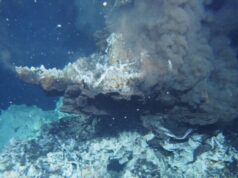Weedy plants will thrive and displace long-lived, ecologically valuable kelp forests under forecast ocean acidification, new research from the University of Adelaide shows.
Published in the journal Ecology, the researchers describe how kelp forests are displaced by weedy marine plants in high CO2 conditions, equivalent to those predicted for the turn of the century.
Carbon emissions will fuel the growth of small weedlike species, but not kelps — allowing weeds to take over large tracts of coastal habitats, the researchers say.
“Carbon emissions might boost plant life in the oceans, but not all plant life will benefit equally,” says project leader Professor Sean Connell, from the University of Adelaide’s Environment Institute. “Weedy species are quicker to capitalise on nutrients, such as carbon, and can grow faster than their natural predators can consume them.
“Unfortunately, the CO2 that humans are pumping into the atmosphere by burning fossil fuels gets absorbed by the ocean and favours weedy turfs, which replace kelp forests that support higher coastal productivity and biodiversity.”
Find your dream job in the space industry. Check our Space Job Board »
Led by the University of Adelaide, the international team from Europe, Canada, USA, Hong Kong used natural volcanic CO2 seeps to compare today’s growth of weeds and kelps with levels of CO2 that are predicted for the turn of the century.
“In our study, we found that while elevated CO2 caused some weeds to be eaten in greater amounts, the dominant sea urchin predator ate these weeds at reduced amounts. This enabled the weeds to escape their natural controls and expand across coasts near the elevated CO2,” says Professor Connell.
Fellow researchers Dr Zoe Doubleday and Professor Ivan Nagelkerken, from the University’s Southern Seas Ecology Laboratories, visited the volcanic vents with Professor Connell.
“We could clearly see the effect of CO2 on promoting the dominance of weedy species and the suppression of their natural predators,” says Dr Doubleday.
Professor Nagelkerken says: “Under the level of acidification we will find in oceans in a few decades, marine life is likely to be dominated by fast-growing and opportunistic species at the expense of longer-lived species with specialist lifestyles, unless we can set some change in place.
“We need to consider how natural enemies might be managed so that those weedy species are kept under control,” Professor Nagelkerken says.
Provided by:
University of Adelaide
More information:
Sean D. Connell, Zoë A. Doubleday, Nicole R. Foster, Sarah B. Hamlyn, Christopher D. G. Harley, Brian Helmuth, Brendan P. Kelaher, Ivan Nagelkerken, Kirsten L. Rodgers, Gianluca Sarà, Bayden D. Russell. The duality of ocean acidification as a resource and a stressor. Ecology, 2018; 99 (5): 1005 DOI: 10.1002/ecy.2209
Image:
Kelp forest.
Credit: © cherylvb / Fotolia











